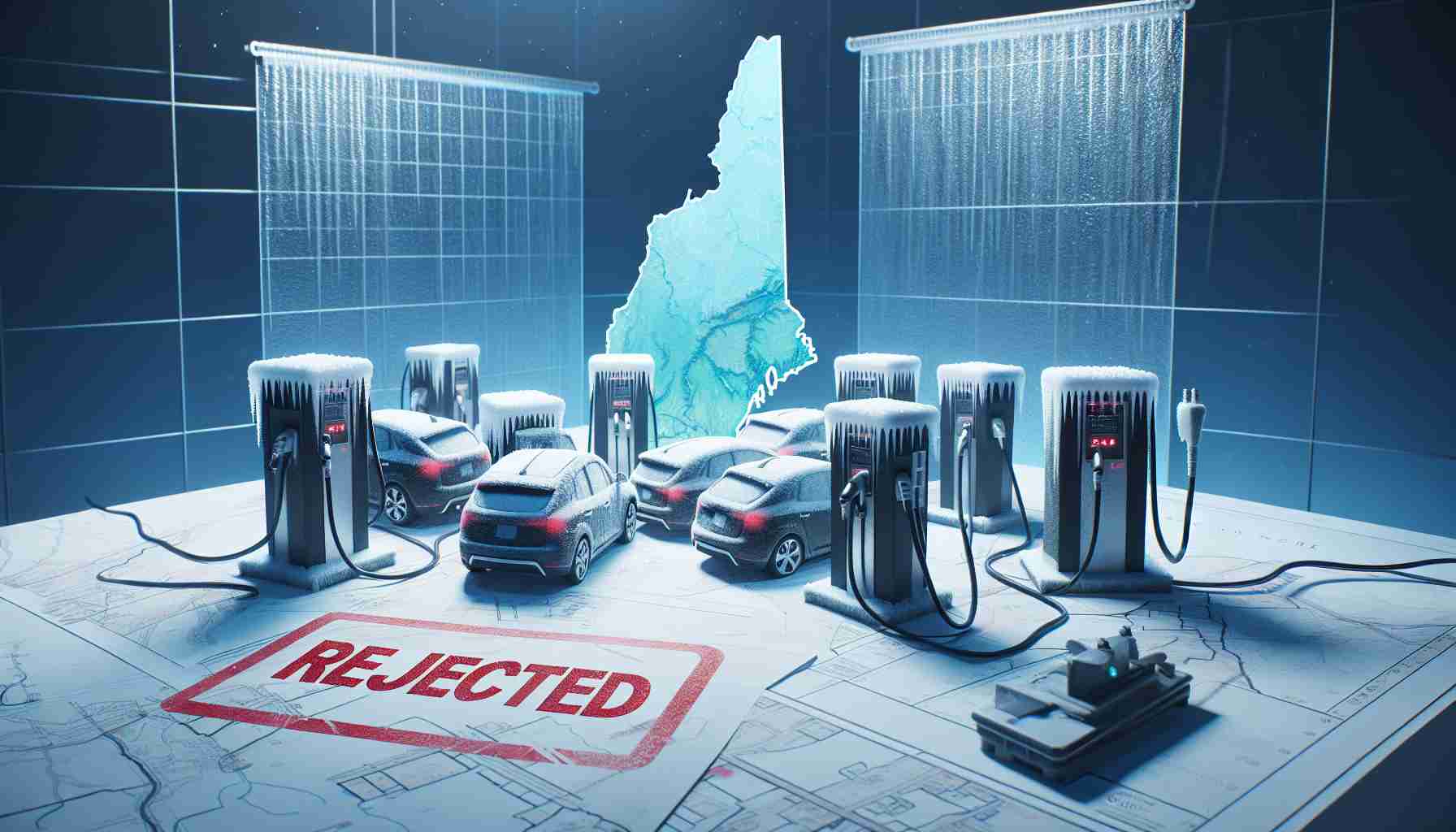- New Hampshire’s plan for a statewide electric vehicle charger network is paused due to federal scrutiny and shifting priorities.
- The state anticipated $17 million from Biden’s infrastructure plan to support green initiatives, but plans are stalled.
- Only $4.5 million is allocated for initial stations in Tilton, North Woodstock, Sanbornville, and Rochester, with future expansions uncertain.
- A federal memo in February halted new funding, requiring states to adjust plans to new federal guidelines.
- Existing projects, backed by committed funds, proceed, but further funding remains in bureaucratic limbo.
- The situation highlights the need for consistent federal support to advance sustainable infrastructure.
New Hampshire’s ambition to power its roads with electric vehicle chargers hit a sudden halt as federal scrutiny casts a shadow over plans for a statewide network. Amid shifting federal priorities, New Hampshire’s Department of Transportation stands frozen, unable to proceed with an initiative set to transform driving in the Granite State.
The state, expecting a $17 million boost under Biden’s infrastructure vision, aimed to position itself as a driving force in the East Coast’s green revolution. But as guidance from the Federal Highway Administration awaits revision, hopes for expansive charging accessibility are now on pause. This bureaucratic bottleneck means that beyond the initial $4.5 million earmarked for four stations in Tilton, North Woodstock, Sanbornville, and Rochester, the future remains uncertain.
The memo, landing like a thud in early February, effectively declared a moratorium on new funding, demanding states recalibrate their plans under fresh federal instruction. New Hampshire officials had envisioned a sprawling network to accommodate the rapid rise in electric vehicles, envisioning roads where long-distance travel wouldn’t hinge on the next charge.
Existing efforts aren’t entirely derailed; the foundational stages, backed by funds already obligated, continue. But the anticipated infusion to further electrify the state’s landscape remains locked. The remainder of the $17 million, crucial for the broader rollout, now lingers in bureaucratic limbo.
The overarching narrative is clear: progress on charging infrastructure doesn’t just hinge on local ambition but also on federal consistency. As New Hampshire navigates this unexpected roadblock, the broader message resounds nationwide—sustainable infrastructure needs unwavering support, not red tape, to drive forward.
Federal Roadblocks Stall New Hampshire’s Green Roadmap: What’s Next?
Overview
New Hampshire’s plans to electrify its roadways with an extensive network of electric vehicle (EV) chargers have hit a significant obstacle due to federal policy revisions. The state’s Department of Transportation, expecting a substantial federal financial boost, finds itself at a standstill after a federal memo called for states to update their infrastructure plans according to new guidelines. This pause affects not only New Hampshire but has broader implications across the United States as states seek to transition to sustainable, electric-powered transportation.
Additional Context and Impact
1. Federal Infrastructure Policies:
The stalled initiative in New Hampshire is part of a larger pattern of federal interventions regarding infrastructure funding. The federal government’s shift in priorities can significantly impact state-level projects, demonstrating the delicate balance between local ambitions and national policy changes. This situation underscores the necessity for coherent and steady federal guidelines to ensure that states can effectively plan and execute long-term infrastructure projects.
2. Economic Implications:
Delays in building the EV charging network could have economic ramifications for New Hampshire. The establishment of such infrastructure is likely to attract businesses and create jobs, from construction to maintenance and operation. The wait for federal directions could dampen these economic opportunities and slow state growth in the green technology sector.
3. Technological Advancements:
As electric vehicles become more efficient and popular, the demand for charging stations is expected to increase. Advancements in battery technology and charging speeds mean infrastructure will need continual updates and expansions, making federal consistency in funding and guidelines crucial for accommodating technological progress and consumer needs.
4. Global and Environmental Perspective:
On a global scale, countries are racing to reduce carbon emissions, with electric vehicles being a key component of many national strategies. The stalling of projects like New Hampshire’s impacts overall U.S. commitments to environmental goals and can influence international perceptions of its leadership in combating climate change.
5. Community and Societal Impact:
Local communities are particularly affected, as the availability of EV chargers can influence residents’ decisions to invest in electric cars. The stalled rollout could delay the benefits of improved air quality and reduced dependency on fossil fuels, which are associated with widespread EV adoption.
Key Questions
– What are the updated guidelines from the Federal Highway Administration, and how will they influence the future development of EV infrastructure?
Understanding these guidelines will be crucial for states to align their plans and continue progress without further delays.
– How are other states responding to similar federal directives, and what can New Hampshire learn from their experiences?
Identifying best practices or strategies from other states could help New Hampshire navigate these challenges effectively.
– What role could public-private partnerships play in overcoming these bureaucratic delays?
Engaging private sector stakeholders might provide innovative funding solutions or accelerated development paths.
Further Resources
– For more information on federal transportation initiatives, visit the U.S. Department of Transportation.
– Explore state-specific infrastructure projects at the New Hampshire Department of Transportation.
– Discover the latest in electric vehicle technology from the U.S. Department of Energy.
In conclusion, the delay in New Hampshire’s EV charging network highlights a critical interplay between federal decision-making and state-level aspirations. The outcome of these adjustments will have lasting effects on the state’s economic and environmental future, as well as implications for broader national infrastructure strategies.












